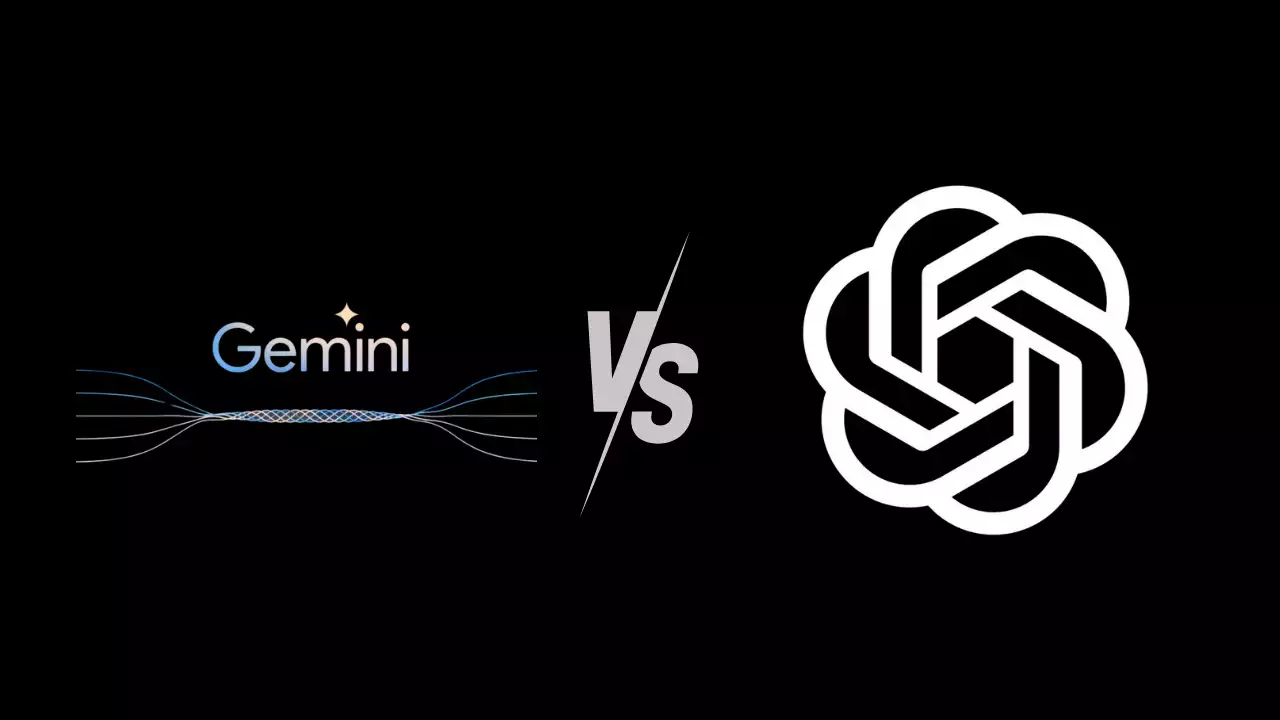In the swiftly evolving realm of artificial intelligence, two behemoths stand face-to-face: Google’s Gemini and OpenAI’s ChatGPT. As AI continues to shape our digital world, it is crucial to understand the unique strengths each titan brings to the table.
Bijin Jose, with a keen eye on tech developments and a knack for dissecting complex innovations into digestible insights, spearheads this exploration. With years of experience as an Assistant Editor for Indian Express Online and his finger firmly on the pulse of technological transformation, he expertly dissects these AI juggernauts.
Google stunned tech enthusiasts worldwide by introducing its Gemini model—a formidable player claiming superiority over OpenAI’s GPT-4. Stacked with three mighty versions—Ultra, Pro, and Nano—Gemini has showcased brilliance in academic benchmarks that predict where the future of AI might steer us.
This revelation ignites curiosity about what makes Gemini tick and how it fares against the phenomenon that is ChatGPT. Read on as we unravel mysteries of modern AI—the battle between giants could redefine how we interact with technology forever!
Key Takeaways
- Google’s Gemini AI has three types: Ultra, Pro, and Nano. Pro is already out; Ultra comes in 2024.
- ChatGPT can write, chat, and even learn over time. You can use it for free or pay for more features.
- Gemini AI aims to be quicker at answering questions and might cost money to use some parts of it soon.
- Both Gemini AI and ChatGPT are good at understanding different kinds of data like text and images.
- These two AIs could change how we work in fields like health, money – handling, learning, and more.
Unveiling Google’s Gemini AI
Google’s Gemini AI is the latest addition to Google’s family of AI models, boasting advanced language understanding and multimodal capabilities. With Gemini ultra, pro, and nano, Google aims to revolutionize AI in various domains.
What is Gemini AI?
Gemini AI is the new smart tool from Google. It’s built to understand and answer our questions better. Think of it as a helper that can make sense out of what we say or type. Gemini comes in three types: Ultra, Pro, and Nano.
Each one does different things for us. The big aim of Gemini AI is to be faster and smarter than other AI like ChatGPT.
The most powerful member of this family will be Gemini Ultra, but it won’t come out until 2024. For now, people are trying Gemini Pro and finding it gives mixed results compared to ChatGPT’s GPT-3.5 version which anyone can use for free.
Some folks get answers quickly with Gemini, especially when they use Google Search because Google has made searches 40% faster with this AI’s help! Soon some parts of Gemini will cost money to use, but right now you can try bits of it without paying anything.
Gemini Family of AI Models
Moving from what makes Gemini AI unique, let’s explore the different versions it offers. Google has designed a range of models to fit various needs. These include Gemini Ultra, Pro, and Nano.
Each tier serves a special purpose. For example, Gemini Pro powers the Bard chatbot which helps with answers on Google apps like Gmail or for creating content on social networks.
On more advanced gadgets like Pixel 8 phones, you find Gemini Nano at work. This smaller version makes sure phone tasks run smoothly without using too much power or space. Although still being built up until its release in 2024, Gemini Ultra aims to be a game-changer with even bigger tasks across many areas in technology.
It promises great improvements in reading and understanding massive amounts of information from things like research papers or data from the internet.
ChatGPT: The AI Phenomenon
OpenAI’s ChatGPT has made a significant impact in the AI world with its impressive capabilities and real-time learning. This section explores the introduction and capabilities of this AI phenomenon.
Introduction to OpenAI’s ChatGPT
ChatGPT is a smart AI chatbot made by OpenAI. It can write essays, answer questions, and even make jokes! You can use ChatGPT for free or pay $20 a month for extra cool features in ChatGPT Plus.
Many people add plugins to their ChatGPT so it can do more things. This AI uses big sets of data and language rules to think like a human when it writes or chats. Now let’s see how Google’s Gemini measures up to this amazing tool.
Capabilities and Impact
Moving from what ChatGPT is to what it can do, let’s talk about its skills and effects. ChatGPT can chat, answer questions, and write essays or poems. It helps people every day by making things easier.
For example, students use it for homework and companies use it for customer service. The AI also learns over time which makes it better at helping.
ChatGPT has a big effect on how we find information and solve problems. Its technology lets us do new things like create art or write music with just a few words typed in. This changes jobs because some tasks that needed humans before can now be done by this AI.
Also, ChatGPT is free but there’s an even better paid version that does more stuff.
Head-to-Head: Gemini vs ChatGPT
Which AI model reigns supreme? We’ll explore the performance comparison, data sources, language models, and multimodal abilities of Google’s Gemini versus OpenAI’s ChatGPT.
Performance Comparison
Gemini Ultra is expected to debut in 2024 and is anticipated to surpass ChatGPT in performance. Gemini AI has proven its ability to outperform human experts in various benchmark tests, showcasing superior performance compared to ChatGPT.
In academic benchmarks, Gemini AI showcased its superiority over ChatGPT, excelling particularly in tasks related to understanding, reasoning, and complex language capabilities. Additionally, Gemini AI’s excellence was demonstrated through its capability of beating ChatGPT across multiple academic benchmarks.
Data Sources and Language Models
Google’s Gemini AI model stands out due to its unique data sources and language models. Trained on real-time internet data, Gemini accesses the most current information, enhancing its performance for complex tasks like translation and summarization.
This fresh and extensive training data gives Gemini a competitive edge by making it more up-to-date, larger, and more potent compared to other language models such as ChatGPT. Its three versions – Pro, Nano, and Ultra – are expected to be integrated into various Google products including the search engine.
Moving forward to analyze the capabilities of these two AI giants in terms of multimodal abilities and real-time learning..
Multimodal Abilities and Real-Time Learning
Google’s Gemini and ChatGPT possess advanced multimodal abilities, enabling them to comprehend text, audio, images, video, and computer code simultaneously. Both AIs have the capability to process various types of data, making them versatile in understanding diverse content formats across different platforms such as social media and cloud services.
This wide-ranging comprehension allows these AI models to perform tasks like natural language processing, voice commands, image recognition on social media platforms with high precision.
Gemini AI stands out with its real-time learning ability from internet data. This feature makes it more up-to-date and powerful for complex tasks such as translation and summarization.
The Future of AI: Who Leads the Race?
Google’s Gemini and OpenAI’s ChatGPT are leading the race in the AI industry, pushing the boundaries of what artificial intelligence can achieve. As these AI titans continue to innovate and develop new capabilities, their advancements will shape the future of AI technology.
The AI Arms Race and Its Implications
The competition between Google Gemini and ChatGPT reflects the ongoing race to develop the most advanced AI models. With potential implications for industries like healthcare, finance, education, and more.
Google’s release of its latest AI model, Gemini 1.0 with three tiers: Ultra, Pro, and Nano has highlighted rapid progress in AI development.
The development of Google Gemini and its superior performance compared to ChatGPT raises important questions about the ethical and societal implications of these advancements in artificial intelligence.
This fierce competition in AI could shape the future landscape across various sectors as organizations seek to leverage the most advanced technologies available.
Conclusion
In conclusion, Google’s Gemini and OpenAI’s ChatGPT are at the forefront of AI technology. Their capabilities and performance have sparked intense debate in the tech world. The practical implications of these advancements could revolutionize various industries, making tasks more efficient and accessible.
It is essential for us to grasp the significance and impact of these innovations as we navigate an increasingly AI-enabled world. Let’s explore further resources, stay informed, and be ready to embrace the transformative power of advanced artificial intelligence.
FAQs
1. What is the difference between Google Gemini and ChatGPT?
Google Gemini uses advanced artificial intelligence from Google DeepMind, focusing on multimodal AI that can handle many types of data. ChatGPT relies on large language models to generate text-based responses.
2. Can Google Gemini and ChatGPT both understand pictures?
Yes, Google Gemini is built for visual recognition as well as text, while the new versions of GPT have started including abilities to work with images too.
3. Who makes Google Gemini and who creates ChatGPT?
Google’s team at DeepMind develops Google Gemini, led by Demis Hassabis. OpenAI developed ChatGPT with help from their Chief Executive Sundar Pichai.
4. Are these AIs smart in common sense understanding?
Both are designed for commonsense reasoning but they perform differently based on their training; Multimodal Ai like Google Bard shows promise in massive multitask language understanding (MMLU).
5. Can these AI tools write computer code?
Yes! Both can generate Python code through generative Ai techniques; Gpt4 has shown impressive skills in this area as well.










